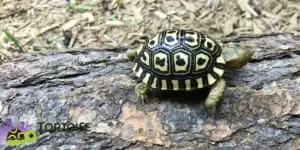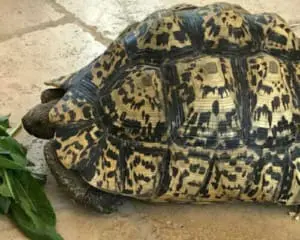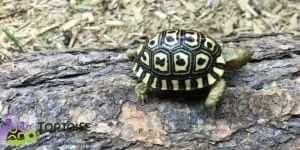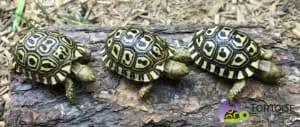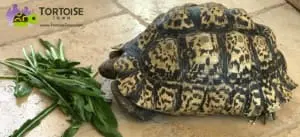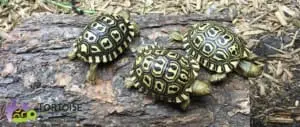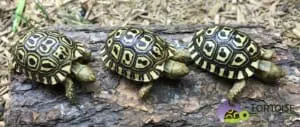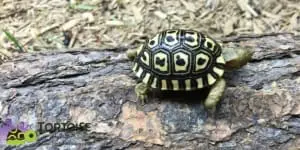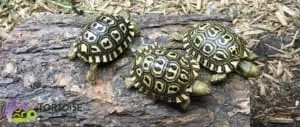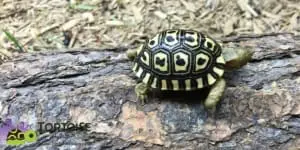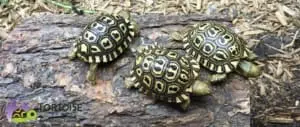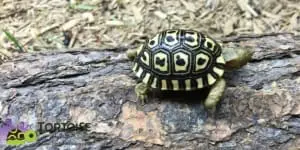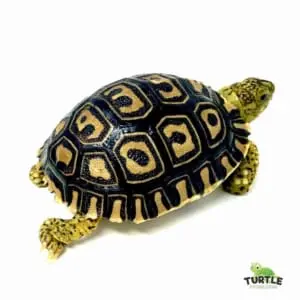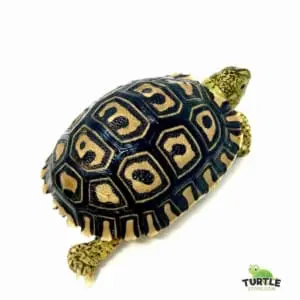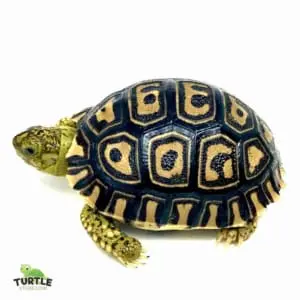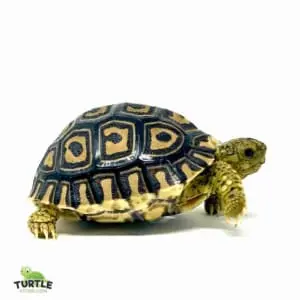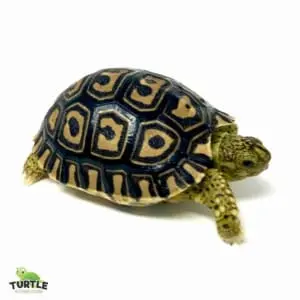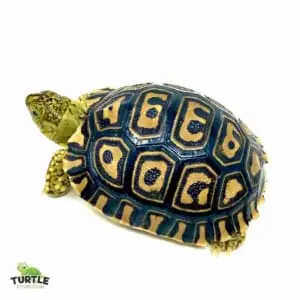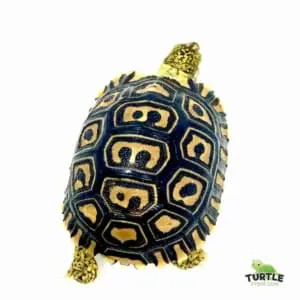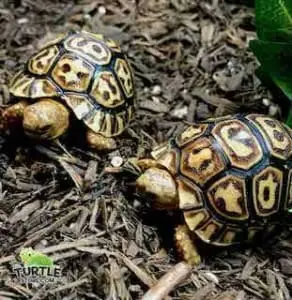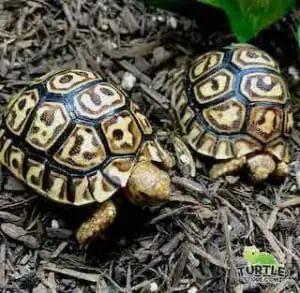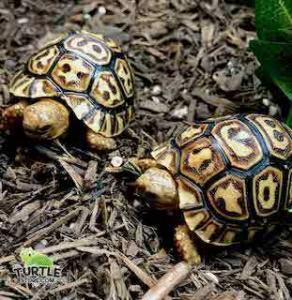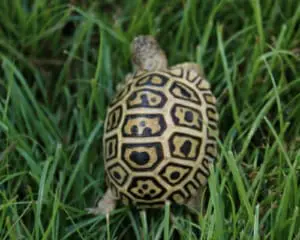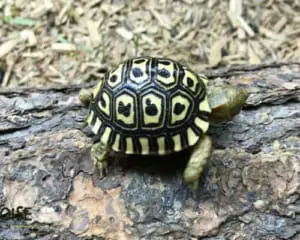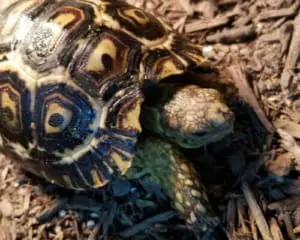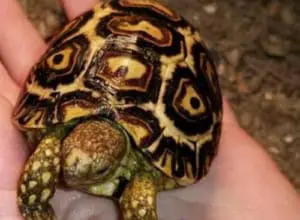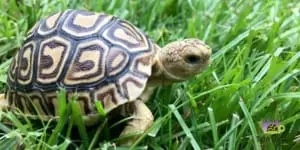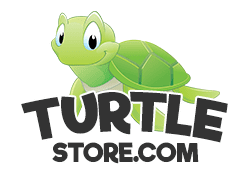Giant South African Leopard Tortoise UVB Lighting
UVB light exposure is extremely important for all tortoises, including baby Giant leopard tortoises. We recommend a Reptisun UVB 10.0 lamp, T5 (tube style). Screw in lamps like the cheap spirals are not recommended and really do not have much of a radius of coverage. Think about the tortoise being outside, getting constant UVB and UVA from every angle. Now, think about the exposure they will get in their habitat inside or outside your home, and try to make them similar. Not easy, is it? Using a T5 high output lamp will give you the best scenario. Using the 10% lamp is good, however for distances 15-24″ above the tortoise, a 12% lamp is recommended. Arcadia UVB lamps are the best in our opinion, though a tad more pricey, they also last twice as long.
Giant South African Leopard Tortoise Care
Caring for a giant leopard tortoise for sale is reasonably easy, so long as you invest the time to learn. Giant leopards are fairly large tortoises and therefore require a larger habitat. At full maturity of say 3×6′, though larger is always better. Multiple female giant leopard tortoises may be housed together in groups of up to 6, but size should be 4 cubic feet larger per female. Using a tortoise table, or tortoise house kit will work, just pay close attention to temperature and humidity. A baby tortoise, in general, will need a higher humidity as the main variable for success.
Our biologist has compiled a fantastic giant south African leopard tortoise care guide. Please be sure to view all aspects of giant south African leopard tortoise care at the pages below:
- Giant South African Leopard tortoise care
- Baby Giant South African leopard tortoise
- Giant South African Leopard tortoise habitat
- Giant South African Leopard tortoise temperature
- Giant South African Leopard tortoise UVB Lighting
- Giant South African Leopard tortoise substrate
- Giant South African Leopard tortoise feeding
- Giant South African Leopard tortoise diet
- Giant South African Leopard tortoise humidity
- Giant South African Leopard tortoise lifespan
- Giant South African Leopard tortoise size
- Giant South African Leopard tortoise soaking
- Giant South African Leopard tortoise housing
- Giant South African Leopard tortoise enclosure
- Giant South African Leopard tortoise water
- Giant South African Leopard tortoise appearance
- Giant South African Leopard Tortoise breeder
- Giant South African Leopard tortoise
- giant south African leopard tortoise for sale
- Giant South African Leopard tortoise for sale online
- Leopard Tortoise for sale
- buy Giant South African Leopard tortoise
Giant South African leopard tortoise humidity
Humidity is important with all baby tortoise species, including the Testudo tortoise family. Baby Giant leopard tortoises require humidity in the area of 75%. When kept indoors, the habitats tend to be on the dryer side and therefore will require some work to increase the humidity where need be. Using a lid, or some type of closed system will help tremendously.
Here at the Turtle store, we raise all of our baby torts (Sulcata, leopards, Aldabra, Russians, Greeks, Egyptians, Marginated, etc) in closed systems with high humidity and LOW air movement. From years of breeding leopard tortoises, we now have mastered the art of raising these beautiful leopard tortoise hatchlings.
Giant South African leopard tortoise temperature
Baby Giant South African leopard tortoises should be kept with an ambient temperature of 86 degrees. A cold spot of 80 is fine and a warm spot of 95 is also nice, however, the ambient temp remains the most important. Here at Turtle store, our main concern is the ambient temp and not getting too cold. We focus more on this than the temperature gradient that is so widely talked about. Finding that the tortoises’ theme to thrive with a median temperature of 86, we now maintain this throughout our daytime enclosure temperatures. Evening temps are allowed to drop into the high 70s, however with very slow moving, humid air, it seems a tad warmer and “muggier” for the tortoises.
Giant leopard tortoise diet
Variety is key when talking about what to feed your new Giant Leopard tortoise. It isn’t really about one thing, it is about feeding a wide variety of high-quality greens and veggies. By feeding a variety you will ensure not to “overdose” your tortoise on certain things. For example, spinach is bad. If you feed spring mix that contains spinach as one of 15 ingredients, it will not be too much where you need to worry about spinach. If all that you ever feed is spring mix, then you have a problem. Turtle store uses a mixture we chop daily of Romaine, Kale, Dandelion, Spring Mix, Endive, Collard, Mustard, and Beet Greens. In addition, we soak our mazuri tortoise chow in water mixed with a 50:50 ratio of calcium with D3 AND Vionate (a multi-vitamin and mineral powder).
Giant South African leopard tortoise water
Giving your baby Giant leopard tortoise access to water is preferred, and soaking daily is required. Soak your baby tortoise in a shallow soaking dish with opaque sides so the tortoise cannot see out. Soak for 10 minutes in 85-88 degree warm water once daily. Typically soaking your tortoise and then placing them directly atop their pile of greens and Mazuri is best each morning. Establishing a daily routine when possible will benefit your tortoise a great deal.
Giant South African Leopard tortoise habitat
Baby Giant leopards can exist in something as small as a 24×12″ sweater box. Keeping humidity high is key, so these work. Using a fish tank is not recommended but also can work if set up properly. You will want to cover the sides so that the tort cannot see out, as that will cause he or she to become anxious and constantly try to escape via the clear see-thru side(s). We like to use the 24″x15″x48″long PVC style single glass front reptile cages available at reptile basics. For UVB fitting them out with a 36″ T5 10.0 fixture is easy.
Giant Leopard tortoise substrate
For substrate, we recommend a nice mixture of 50:50 potting soil and potting mix (organic). Be sure there are no additives or fertilizers included as that could kill your tort. Baby Giant leopard tortoises do burrow so providing 4″ of the substrate is recommended and spraying it down with a pressure sprayer daily is great. Spraying the soil and your tort(s) in the morning to simulate a morning dew so to speak works create. One added but important benefit of doing this is creating a super humid microclimate for your tortoise should they choose to burrow. It is in these microclimates in which baby tortoise exists in the wild. Remember not to call the Russian tort a leopard turtle or leopard turtle for sale, it’s a tortoise!
Giant South African leopard tortoise Size
We are seeing growth rates of 16-18″ with the hybrids, so they are definitely larger than the traditional east African leopard tortoise, but not as large as the 100% pure Giant South Africans. They do exhibit double dots on scutes like pure Pardalis Pardalis but not always and not on every acute.
Giant South African Leopard Tortoise Appearance
-
The hybrid giants are not only bigger, they are known for being are a bit more outgoing and personable than a normal leopard and also have a marbled spotted pattern on their head and body, setting them apart from the traditional sub species. They do well on Mazuri tortoise chow, opuntia cactus and a variety of mixed greens and grasses with a dusting of calcium supplement all available at the turtle store.
- Pardalis pardalis is a rarely seen, very large growing subspecies of the common Leopard Tortoise (pardalis babcocki) from the extreme southern portion of the Leopard Tortoise range into Namibia and South Africa. The giant of the Leopard Tortoises, reaching lengths of 14-22 inches on average at 40-65lbs, Giant South African Leopard Tortoises are easily distinguished by their spotting in the center of their shell, having “double or triple dots” rather than single or no dots like a standard leopard tortoise (pardalis babcocki).
Giant South African Leopard Tortoise Lifespan
If taken good care of, Giant South African Leopard tortoises have a 90 year life expectancy! It is important to consider this when purchasing your baby leopard tortoise.
-
Giant South African leopard tortoise Breeder
Be very careful when choosing your giant south African leopard tortoise for sale, as MOST sites on the internet are selling REGULAR pardalis babcocki leopard tortoises and saying they are giants. The giants are not only bigger, they are known for being are a bit more outgoing and personable than a normal leopard and also have a marbled spotted pattern on their head and body, setting them apart from the traditional subspecies. They do well on Mazuri tortoise chow, opuntia cactus and a variety of mixed greens and grasses with a dusting of calcium supplement all available at turtle store. One shipping charge covers up to 3 tortoises.
Giant South African leopard tortoises for sale from the Turtle Store
Turtle store offers Giant leopard tortoise hatchlings for sale, as well as well started baby Giant leopard tortoises. Looking for a larger Giant South African leopard tortoise for sale? We also offer yearlings and juvenile tortoises for sale online. Our breed stock of adult Giant leopard tortoises for sale is composed of some of the nicest Pardalis Pardalis tortoises in the world. Our biologist has put together one of the nicest Giant South African leopard tortoise breeding groups in the world. Because of this, we are able to offer some of the nicest baby giant leopard tortoises for sale online anywhere. Captive bred baby tortoises for sale should be the only that you choose when shopping for the right tortoise breeders.
More than just baby Giant South African Leopard Tortoise for sale
The turtle store is your source for the largest selection of captive bred baby tortoise for sale and adult tortoise for sale. All of our captive bred baby tortoises come with our full live arrival and health guarantee. Here at the turtle store, we work with over 25 species of turtles for sale including baby turtles for sale and captive bred tortoises. The turtle store guarantees you the largest selection of healthy, captive bred turtles and tortoise for sale anywhere in the USA.
